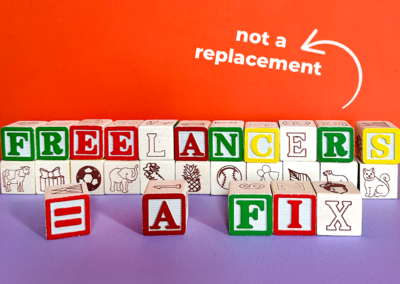We’ve been working in a whole new way for the past 18 months and counting. During this time, we flexed our physical spaces, we flexed our hours around home schooling and our roommates’ call schedules, we flexed our boundaries between work life and home life, and we flexed our humanity through compassion for the emotional toll it all was taking on ourselves and our co-workers. The differences between this time and all the years of work leading up to it go so much deeper than desk location.
Almost like snapping out of a cultish trance, we’ve realized that strict parameters around work had inappropriately compromised the most important things in life – including our families and our physical and mental health. Business leaders are wrangling with the uncertainty of what to do next, but the people doing the work have never had more clarity.
According to the 2021 Rosie Report, 63% of marketers are planning a job change amidst what is widely becoming known as The Great Resignation. Work-related choices are profoundly abundant allowing people to find confidence in their new requirements and criteria for work choices; 100% of marketers want the option to work remote and 2 in 5 must have flexible hours. And the overwhelming subtext of it all is about who is really in control of our lives.
What we see emerging is an era of greater trust, flexibility, freedom, and also accountability in work. One in which people are liberated to work in the time, place, and style that best serves the work and their personal circumstances – and supported by systems that value conscientious independent effort and self-motivated commitment. The Age of Autonomy.
Going independent, gig working, or starting your own business or small shop is an obvious route to more agency. But we believe this can, should, and will apply to traditional full-time and part-time employees, and long-term contractors and consultants as well. To get there, employers will need to provide this trust and flexibility, and workers of all kinds will need to respect that trust with true accountability.
It’s not going to happen overnight. The barriers we need to overcome are procedural – rethinking formal rules and boundaries governing how we work, cultural – rethinking ingrained beliefs and perceptions that result in stigmas or unconscious biases toward those working in a different way, practical – such as how deadlines are set and how work is distributed and managed amongst team members, and not insignificant.
But embracing this paradigm can benefit workers of all classifications and status. And employers who embrace autonomy as a workplace value will have a healthier, happier, more productive workforce – in other words, a major competitive advantage. The Age of Autonomy collection on the Rosie Report is designed to offer insight and practical guidance for employers and workers alike to make it real.
Editor’s Socials – Jessie Kernan: Instagram, Twitter, LinkedIn



